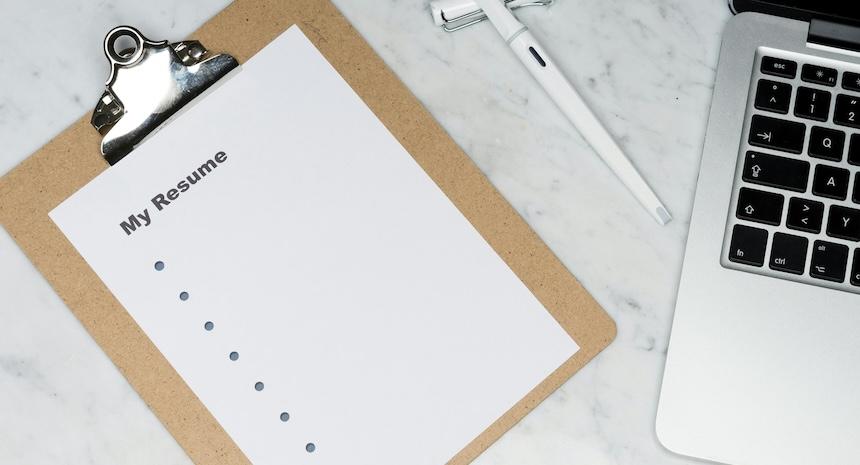Your cover letter introduction is your first chance to grab a hiring manager's attention and make a strong impression.
A good opening sets the tone for the rest of your cover letter, showing enthusiasm for the job and highlighting why you're the right fit.
With our help, you can ensure you will start your cover letter off on the right foot.
In this guide, you'll learn:
- The best ways to start a cover letter with compelling opening lines.
- Common mistakes to avoid when crafting your introduction.
- Examples of attention-grabbing cover letter openings for different situations.
Want help making your cover letter? Use our AI Cover Letter Generator to get everything you need in just a few minutes. With customizable templates and content suggestions, you'll have a high-quality cover letter you can use for any job.
How to Address a Cover Letter
As you write your cover letter, consider how one of the first things hiring managers notice in a cover letter is how it's addressed. A personalized greeting shows that you've taken the time to research the company and tailor your application.
Addressing your cover letter to a specific person can help make a stronger impression and increase your chances of catching the hiring manager's attention.
Who to address a cover letter to
Whenever possible, address your cover letter to the hiring manager or recruiter responsible for filling the position.
Using their name adds a personal touch and demonstrates initiative, especially if it is included in the job posting.
If the hiring manager's name isn't listed in the job description, try these methods to locate it:
- Check the company's website: Look at the "About Us" or "Team" page for key personnel in the department.
- Search LinkedIn: Use LinkedIn to find hiring managers, recruiters, or department heads associated with the job posting.
- Call or email the company: If the name isn't available online, call the company's HR department and politely ask for the hiring manager's name.
How to start off a cover letter without a name
If you can't find the hiring manager's name after researching, it's still important to use a professional and appropriate salutation. The goal is to make your greeting sound personalized rather than generic.
Acceptable alternatives include:
- Dear Hiring Manager
- Dear [Department] Team (e.g., Dear Marketing Team, Dear IT Department)
- Dear [Job Title] Hiring Manager (e.g., Dear Sales Manager Hiring Team)
Avoid outdated or impersonal greetings like:
- To Whom It May Concern – This phrase is considered too formal and outdated.
- Dear Sir or Madam – This sounds generic and impersonal.
Using a thoughtful and professional salutation sets the right tone for your cover letter and shows you've made an effort to address it appropriately.
Check out our cover letter formats page to get a better idea of how to structure your letter effectively.
How to Write the First Paragraph of a Cover Letter
The first paragraph of your cover letter is crucial—it's your opportunity to grab the hiring manager's attention and make them want to read on.
An effective introduction sets the tone for the rest of your letter, establishing enthusiasm for the position and giving a preview of what makes you a great fit.
Keep it short and impactful
Your opening paragraph should be concise and engaging, ideally two to three sentences long.
Hiring managers skim through applications quickly, so your introduction needs to deliver value immediately without unnecessary fluff.
What to include in your first paragraph
A compelling cover letter opening should include:
- Your enthusiasm for the job and company: Express why you're excited about the role and what draws you to the company.
- A strong achievement, skill, or qualification: Highlight a key accomplishment or skill that aligns with the position.
- Mentioning a referral (if applicable): If someone at the company referred you, mention their name early to establish credibility.
Best practices for writing the first paragraph
To craft an engaging opening, follow these best practices:
- Be specific: Avoid vague or generic statements like "I am writing to apply for the marketing manager position." Instead, make it unique by including specific facts about your qualifications, such as quantifiable achievements or a brief personal anecdote that demonstrates your interest in the position.
- Align with the company's mission: Reference something about the company that resonates with you, such as their values, projects, or reputation.
- Focus on what you bring to the role: Rather than stating what you want, showcase how your skills or experience benefit the company.

10 Examples to Begin a Cover Letter
There's no single best way to start a cover letter, but using a compelling, tailored approach will help you stand out from other applicants.
Below are several great cover letter introduction examples based on different strategies so you can have a variety of inspiration in writing your own.
1. Express enthusiasm for the role
Hiring managers want candidates who are genuinely excited about the position and the company.
"I have always admired [company name] for its commitment to innovation, so when I saw the opening for [job title], I knew I had to apply. With my background in [relevant skill or experience], I am eager to contribute to your team's success."
2. Highlight a major accomplishment or quantifiable result
Lead with a key achievement that directly relates to the role to immediately showcase your value.
"Increasing annual revenue by 35% and leading a team of 10 marketers has been my proudest accomplishment in my career. Now, I'm eager to bring my expertise in data-driven marketing to [company name] as your next [job title]."
3. Reference a company value or mission and why it resonates
If the company is known for a specific value, project, or mission, show that your goals align with theirs.
"As an advocate for sustainability in design, I was excited to see that [company name] is leading the industry in eco-friendly construction. My experience in sustainable materials sourcing and project management makes me eager to join your team as [job title]."
4. Mention a mutual connection or referral
If someone referred you, mentioning their name in the introduction helps establish credibility.
"After speaking with [referrer's name] about the exciting projects at [company name], I knew I had to apply for the [job title] position. My background in [relevant skill or experience] aligns well with your team's goals, and I'd love the opportunity to contribute."
5. Ask a thought-provoking question
Starting with a relevant question can engage the reader and demonstrate that you understand the company's needs, fulfilling the purpose of your cover letter.
"How can a business increase customer engagement while cutting costs? That's the challenge I tackled at [previous company], and I'd love the opportunity to bring my expertise to [company name] as your next [job title]."
6. Start with a bold statement about your expertise
A confident, powerful opening line establishes your authority and unique value from the start.
"Transforming struggling sales teams into high-performing revenue drivers has been my specialty for the past five years. I'd love to bring this expertise to [company name] as your next [job title]."
7. Share a personal story that connects with the job
A short anecdote that relates to your career path or passion for the industry can make your introduction memorable.
"Ever since I designed my first website at 15, I knew I wanted to work in digital marketing. Now, after five years of experience in SEO and content strategy, I'm eager to bring my skills to [company name] as [job title]."
8. Reference a recent industry trend relevant to the company
Demonstrating knowledge of current trends positions you as an industry expert.
"With AI-driven marketing strategies revolutionizing customer engagement, companies like [company name] are leading the way. As a data-driven marketer, I'm excited by the opportunity to contribute to your team's innovative approach."
9. Mention an impressive statistic about the company and your contribution potential
Using a company's success or growth metrics in your opening shows that you've done your research and see how you fit into their goals.
"With [company name]'s customer base growing by 40% last year, your team needs a skilled account manager who can maintain strong client relationships. My track record of boosting client retention rates by 25% makes me eager to join your team."
10. Use a creative hook related to the industry
If appropriate for the industry, a clever or creative opening can help you stand out while remaining professional.
"Great design isn't just about aesthetics — it's about storytelling. As a graphic designer with a passion for visual narratives, I'm excited about the opportunity to bring your brand's story to life at [company name]."
Cover letter example
Here is a complete cover letter example that shows how to go from your opening to the rest of your document.
What Not to Do When Starting a Cover Letter
A weak cover letter opening can hurt your chances of standing out. Avoid these common cover letter mistakes to ensure your introduction grabs attention.
Avoid generic, overused openings
If you start your cover letter with a boilerplate opening, chances are you will bore your reader. Instead, make more of an impact with a personal touch. It can help to show some enthusiasm or specifically provide a relevant skill or achievement.
For example:
- Instead of saying: "I am writing to apply for the sales director position at ABC Goods Inc."
- Try saying: "My success as the top sales performer for seven straight months at my current employer has motivated me to apply for the sales director position at ABC Goods Inc."
Don't forget to mention the job title and company name
Hiring managers review many applications, so it's important to clearly state the position and company you're applying for. Failing to do so can make your application seem generic or unclear, as well as imply that you are submitting the same cover letter to other companies.
For example:
- Instead of saying: "I'm excited to apply for this opportunity."
- Try saying: "I'm excited to apply for the marketing manager position at XYZ Corp., where I can use my experience in brand strategy and digital campaigns to drive engagement and sales."
Cut the fluff — keep it concise
Your introduction should get straight to the point. Hiring managers don't have time to read long-winded introductions that don't add value. Keep your opening clear, engaging, and relevant to the role.
For example:
- Instead of saying: "I came across your job listing and, after reviewing the responsibilities, I decided to apply for the analytics director position that requires qualifications I believe I have and can successfully implement at Business Corp."
- Try saying: "With five years of experience in data analytics, I'm applying to Business Corp. for the analytics director role to develop innovative strategies that drive client engagement."
Avoid an overly casual or formal tone
The tone of your introduction should be professional yet personable. Being too casual can make you seem unprofessional, while overly formal language can feel stiff and outdated.
For example:
- Instead of saying something too casual: "Hey there, I'd love to work for your awesome company!"
- Or something too formal: "With the utmost respect, I humbly submit my application for your esteemed consideration."
- Try saying: "I'm excited to apply for the HR associate position at Retailers Retail, where I can bring my human resource skills to help nurture an amazing team of employees."
Don't start with irrelevant details
Your cover letter opening should immediately highlight your value to the company. Starting with unrelated personal details can distract from your qualifications and weaken your introduction.
For example:
- Instead of saying: "Ever since I was a child, I loved problem-solving, which led me to pursue engineering."
- Try saying: "As a mechanical engineering graduate with hands-on experience in product design, I'm excited to apply for the junior engineer position at Engineering Solutions Tech."
Key Takeaways
-
Your cover letter introduction matters:
It's your first chance to grab attention and show enthusiasm for the job. A strong opening sets the stage for the rest of your letter.
-
Personalization is key:
Address your cover letter to the hiring manager whenever possible. If you can't find a name, use professional alternatives like "Dear Hiring Manager" or "Dear [Department] Team."
-
Keep the first paragraph concise and impactful:
Focus on expressing enthusiasm, highlighting a key qualification, or mentioning a referral in two to three sentences.
-
There are multiple ways to start a cover letter effectively:
Tailoring your introduction makes a difference, whether by showcasing an accomplishment, referencing company values, or asking a thought-provoking question.
-
Avoid common mistakes:
Don't use generic openings, forget to mention the job title, or start with irrelevant details. Keep your tone professional and engaging without being overly formal or casual.
-
Use examples as inspiration:
Reviewing different introduction styles can help you craft a compelling opening tailored to your experience and the job.
FAQ
Last Updated: March 17, 2025
The best way to start a cover letter is with a compelling opening that grabs the hiring manager's attention. You can:
- Express enthusiasm for the role and company.
- Highlight a key achievement or relevant skill.
- Reference a company's value or mission.
- Mention a mutual connection or referral.
Yes, "Dear Hiring Manager" is a professional and widely accepted alternative if you can't find the hiring manager's name. Other options include:
- "Dear [Department] Team" (e.g., Dear Marketing Team)
- "Dear [Job Title] Hiring Manager" (e.g., Dear Sales Manager Hiring Team)
- Avoid outdated phrases like "To Whom It May Concern."
Your introduction should be two to three sentences long — concise and engaging. Hiring managers skim applications quickly, so get to the point without unnecessary details.
Yes! Tailoring your opening paragraph to each job shows that you've researched the company and are genuinely interested in the position. Customizing your introduction can make your cover letter stand out from the rest.
Conor is a writer for Resume Now. He has over five years of professional writing experience and professional development training. Conor has written on a range of career development topics.
More resources

What Is an Elevator Pitch for an Interview? + Examples
Imagine you step into an elevator and right beside you is a h...

Bullet Points on Resume: Examples & Guide for 2025
Bullet points on your resume make your experience and accompli...

10 High-Paying Side Jobs You Can Do From Home
Paying down debt covering your bills saving for a vacation ...

Banker Resume: Examples, Templates & Tips
Conor McMahon CPRWCareer Advice Expert Conor is a writer for ...

Professional Staff Accountant Cover Letter Sample & Writing Guide
When you re job hunting it can be easy to get bored and frustr...

